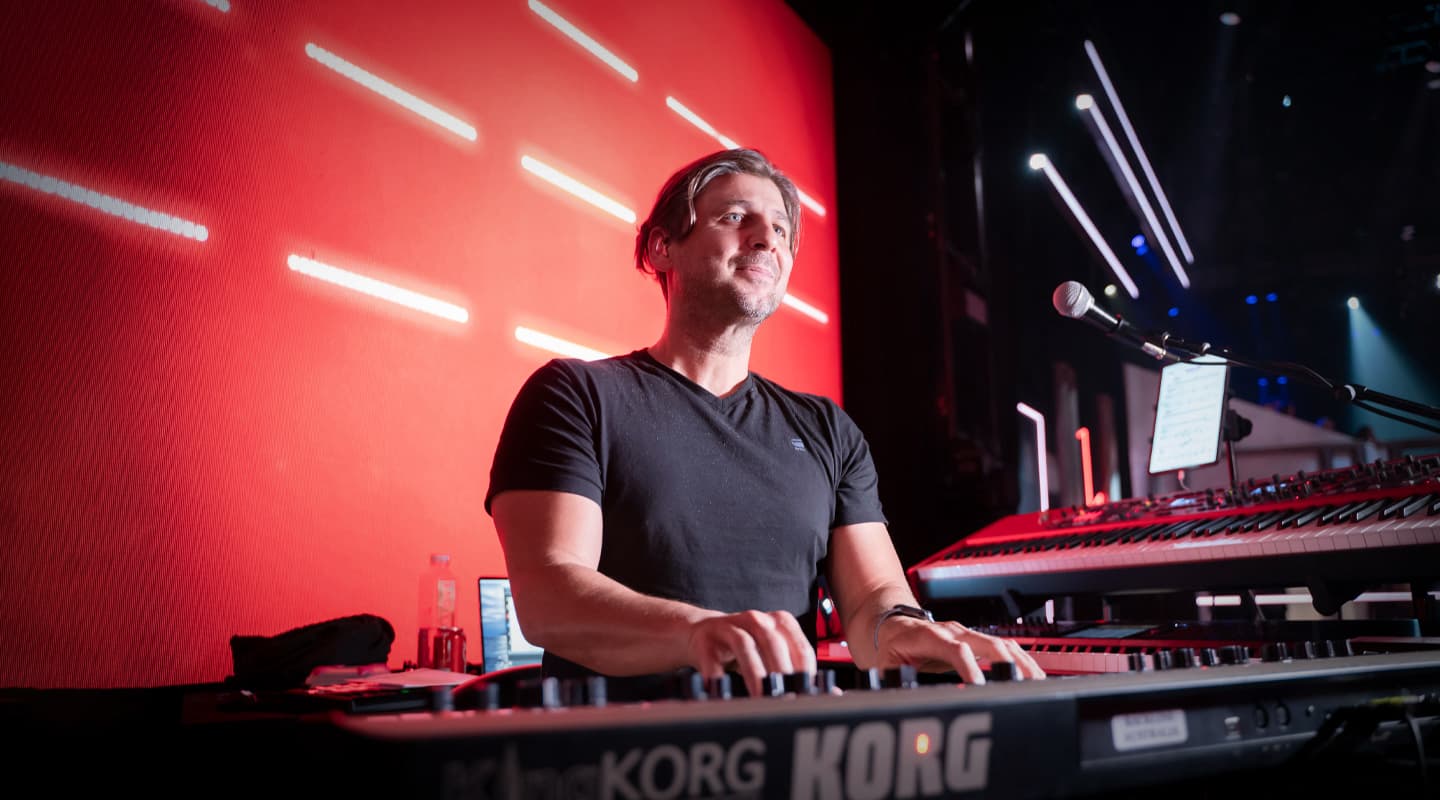
Adam Sofo, MD
Adam Sofo has built a career by combining a go-get-it attitude with being the most musical guy in the room. He discusses his minimalist approach and his secret to longevity.
Adam Sofo is a busy man. When he’s not out touring with some of Australia’s best known artists he’s racing deadlines writing and producing music for a host of big TV network series like MasterChef and Lego Masters, as well as a slew of documentaries and dramas. Then there’s the not-so-insignificant matter of creating all the backing tracks for Channel 7’s blockbuster vocal talent show The Voice every year since its inception. Equally at home onstage and in the studio, Adam’s recipe for success involves keeping a calm and creative mindset, lots of hard work and sticking to a streamlined and carefully curated digital workflow.
AT: Tell us a little about how you got started in music.
Adam Sofo: I grew up learning music by ear and my grandfather was a big part of that. In Italy at the start of WWII, like most young men, he was drafted into Mussolini’s army and he couldn’t join the infantry because he had flat feet, so they asked him what else he could do. He told them he could play five instruments and, to cut a long story short, he ended up playing in Hitler’s marching band! After the war, he came over to Australia on a boat like most European immigrants did in the ’50s looking for a better life and he started up the first school of music in Melbourne. He ended up having about 150 students and he raised a family of seven kids. When I was growing up, my extended family would always come around, and everyone played an instrument and I’d be there listening. My grandfather played everything: mandolin, trombone, guitar, piano — anything he picked up he could play, and he was the one who really inspired me. A conversation we had when I was 13 in his music room just before he died really stuck with me. He said, don’t ever follow money, always follow your passion. He told me, music’s a hard road because it’s not about the money, it’s about your art. If it’s something that you feel really passionate about and it makes you happy, make sure you’re doing it for the right reasons. I think about that conversation a lot — I’m lucky enough to make a living from music, it’s all I have ever known and done. Later, I did formal lessons and exams and then completed a graduate diploma in arranging and composition at the ANU in Canberra.
AT: And was live performance a part of your life by that point?
AS: I started playing in bands and making a living playing music pretty much from the time I started uni — the gigs just kept coming. When I finished at ANU I did the cruise ship thing for a couple of years in America, which enabled me to travel extensively. I was MD (musical director) on a bunch of cruise ships and in-between contracts I travelled around the world. Eventually I moved to Sydney and started getting to know musicians there. One day, out of the blue, I got a call to audition with this young rock band Silverchair. At the time I was more into pop and RnB. I’d spent five years playing in a latin band which was my bread and butter, and I wasn’t really into rock so much then because it didn’t use keys as a feature instrument so much. That said, I knew they were a great band, and I went ahead and did the audition. We got on really well and I got the job playing keys with Silverchair. We toured extensively around the world for about two years. After that, I started moving around a fair bit within the Sony Music scene. I played in Delta Goodrem’s band and worked on a couple of her studio albums, worked with Guy Sebastian, Damien Leith, Natalie Bassingthwaighte, and a few others on the odd occasion. Once you’re in that circle, you fill in for a lot for other musicians, so you play in a lot of different bands or a signed artist hears about you and they use you for something.
AT: One thing leading to another…
AS: Yes and then one day I got a call asking if I wanted to play on this new concept talent show called The Voice.
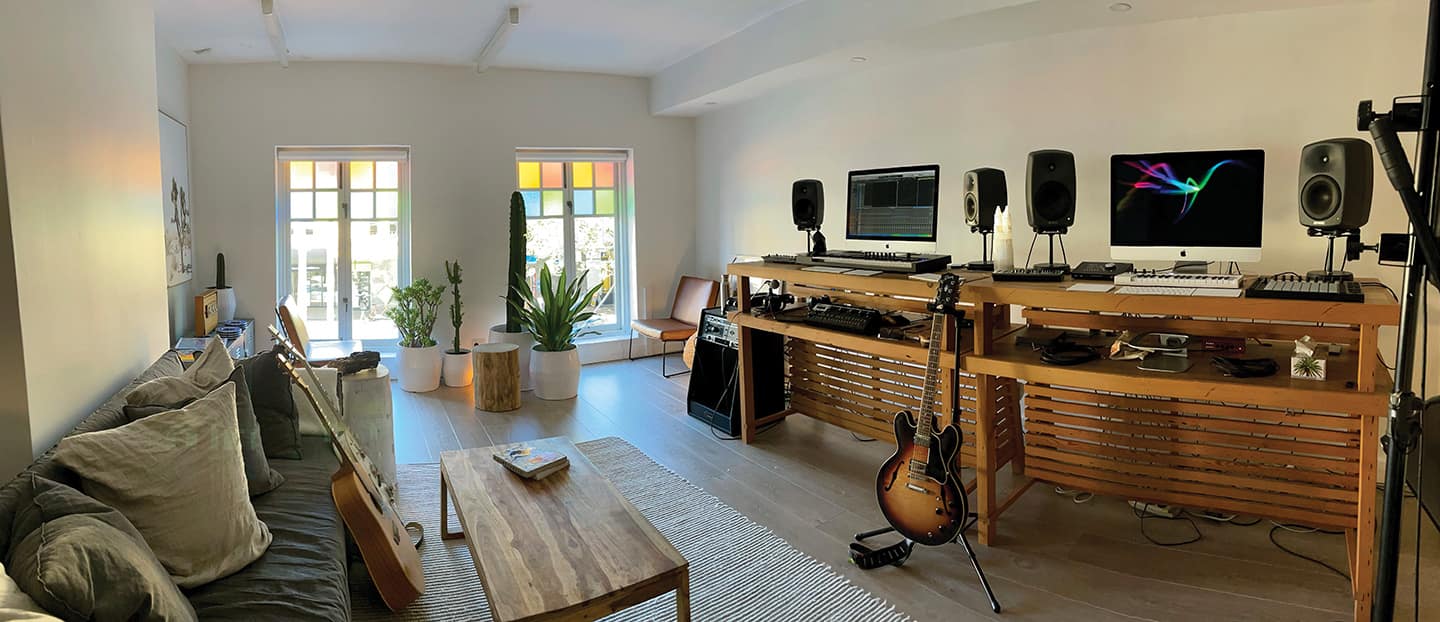
YOU’RE THE VOICE
AT: Can you describe your role on The Voice?
AS: So I play keyboards and I’m also the programmer. It’s a very technical role that involves sound design, creating all the additional instruments and backing tracks that accompany us on stage. One of the key things that I do, is program all the big orchestral tracks. That’s really one of my specialised skills — something I may do better than most and I think that’s maybe why they haven’t got rid of me yet, because I’m an old bastard. They can’t replace me with Karaoke tracks just yet! My speciality away from the piano is programming, sound design, samples, and production.
AT: What are your go-to sample libraries for this work?
AS: I’ve collected a lot of things over the years to create my own unique sound. A lot of people tend to go out and buy a sample library because they’ve heard someone else is using it, and I don’t think that’s necessarily always the best way. I like to use my ears and I love plug-ins that only have one knob! One of the writers that I collaborate with a lot at The DA’s Office [where Adam is a creative director and composer] is Anthony Ammar, and I think he makes some of the best software libraries in the world. His company is called Evolution Series and many Hollywood Film composers like Hans Zimmer and Theodore Shapiro use his sample libraries. He’s particularly well known for his world percussion series. He’s got this way of capturing instruments that I think blows everyone else out of the water. Native Instruments is my main sample platform but I’ve literally got an 8TB hard drive full of samples. I use software from companies like Spitfire audio, LA Scoring Strings, to Project Sam, Arturia, Izotope, Soundtoys, Kush Audio… I could rattle off the names of 50 different software companies that I use. In terms of the production that you hear on the show, I create a lot of my own sounds with some helpful plug-ins.
AT: Do you have processing chains that you rely on for certain sounds?
AS: Yep, I build all my own busses and sends with specific customised signal paths of compressors, reverbs, filters and EQs that make the production sound really good. Having all of that stuff at the ready helps me find that uniqueness I’m looking for and I can deliver great results quickly.
They can’t replace me with Karaoke tracks just yet! My speciality away from the piano is programming, sound design, samples, and production
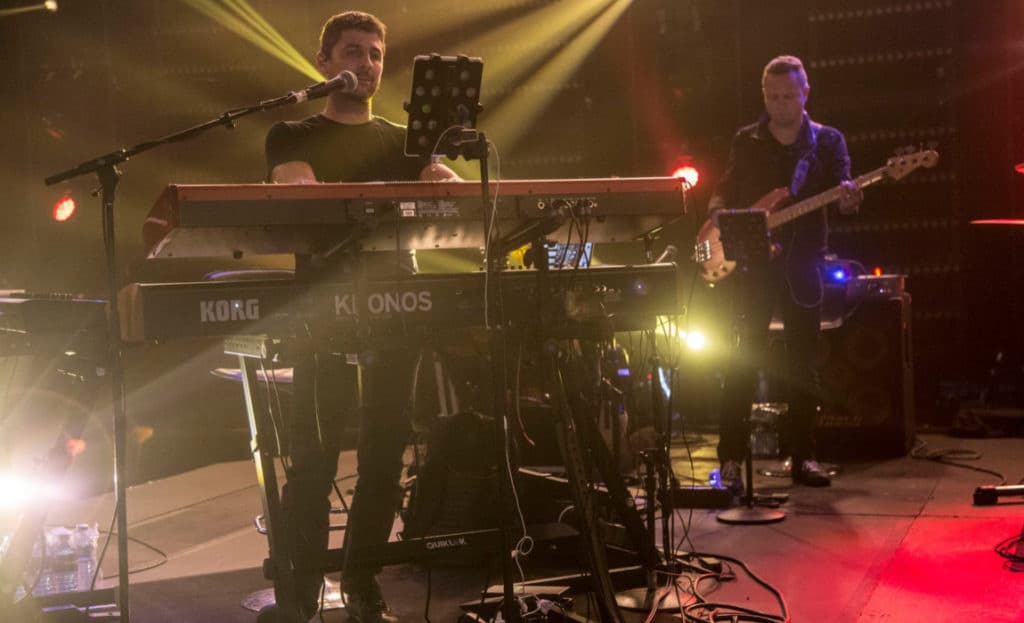
STUDIO SENSIBILITIES
AT: What about in the studio? Do you have a big setup at home?
AS: Some people might read this and think I’m crazy but basically I have a setup I can fit in to a backpack. I’m a believer that all the ideas come from inside. They don’t come from having a lot of gear. For me, becoming a minimalist in the studio increases your creativity. Having all that hardware lying around can be a real distraction, and I know a lot of people in that world who don’t work a lot. I think it’s very prohibitive having all that stuff…you don’t need it! For me I just need a MIDI controller keyboard, a laptop and some really high quality headphones and hard drives. I can literally throw my stuff in a backpack, get on my motorbike and ride to someone’s house to record a session or mix a track in a cafe or write a song in the park on a sunny day. If I need to record live drums I can go to a big studio like 301 in Sydney, plug my laptop in and run a session from there. I’ll also take my laptop into a mix room and do analogue mixes through a desk. It’s really simple. I do have high quality monitors with a sub at home but that’s about it.
For someone like myself being a crossover musician, I can take tracks I’ve worked on at home for The Voice to the show and load them into the OB truck which outputs all the programmed audio, then I’ll be running live string samples off my laptop onstage.
The new laptops these days are frightening! I always buy the most powerful one available and I know I’ll get at least 4 years out of it until it starts to max out. Then it’s time to buy a new one again. For me, it’s such an important part of my workflow. Working on The Voice means you’ve got to be ready for anything. You might rehearse a song with an artist and a coach will change it last minute for another song you don’t know and don’t have time to rehearse. You’ve really got to be on top of your shit, which is why I also really like the Korg gear when we’re in those live performance situations.
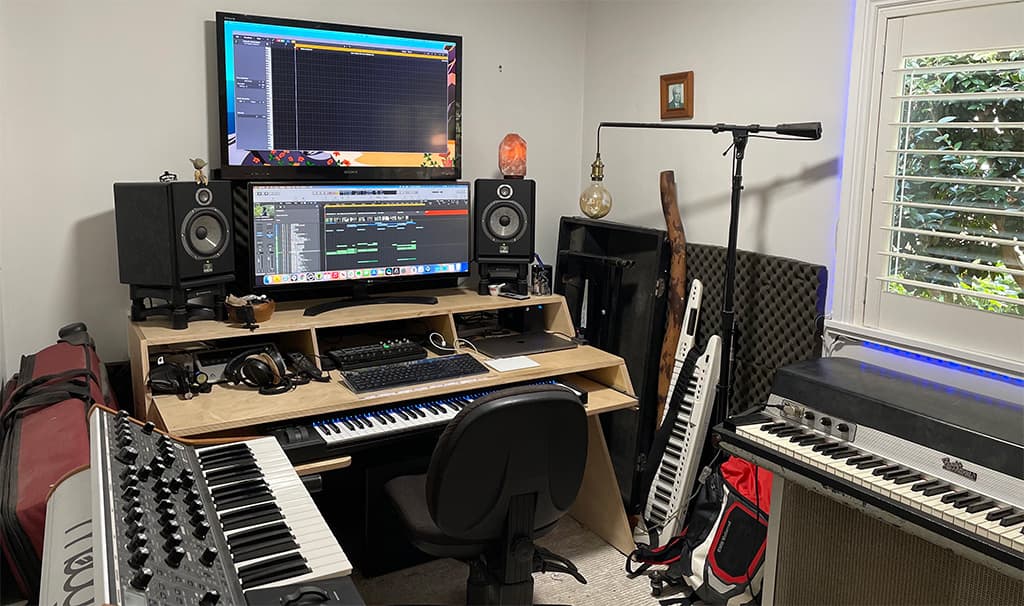
AT: I notice you’re driving a pretty impressive looking Korg Kronos onstage.
AS: Yeah I’ve got a Kronos and a King Korg. I use the Kronos for about 80% of what I do, and the King Korg is for the really gnarly dance tracks and the future pop stuff we do. What I love about the Kronos is that it’s powerful, it’s got amazing internal sounds and you can pretty much make any sound you can imagine if it isn’t already there. It’s also got a really powerful multi-effects engine that sounds great and I love the versatility of it. I’ve probably got about 120 presets that are my go-to live sounds and I keep adding to them every year.
AT: You are working with a lot of up and coming vocalists on the show. Any advice for the musicians, engineers and producers reading this?
AS: I’m always A/Bing my work with current stuff and I’ve got a bit of a mantra about being open to learning more and trying new things. I think that’s a really important part of what we do as musicians. When people get to my age they can get a bit stuck and set in their ways, and they don’t want to listen to young people because they think they know everything. Discovery is the big thing for me, and if you’re passionate about music you can keep discovering new things.
The other bit of advice I have is that ego has no place in music. Music is something we all share, It’s the oldest language, ancient communication, it’s art, it’s spiritual healing and it connects us all by the very frequencies it produces. For those reasons, respect each other, listen, be kind, collaborate and be open minded. That is how we keep our industry thriving.




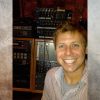






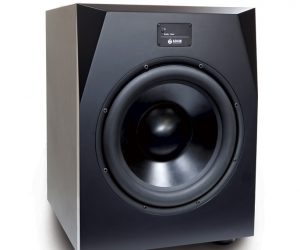










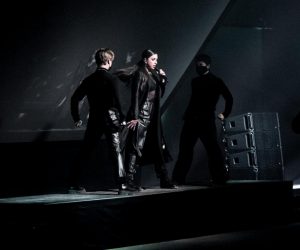


RESPONSES